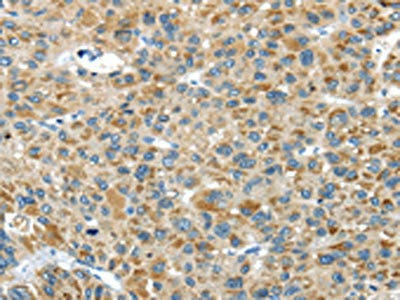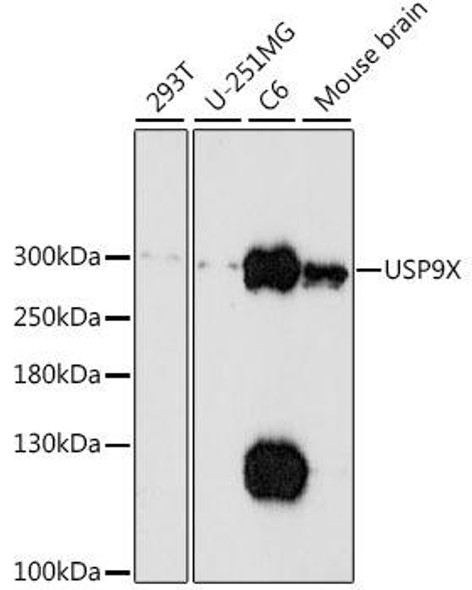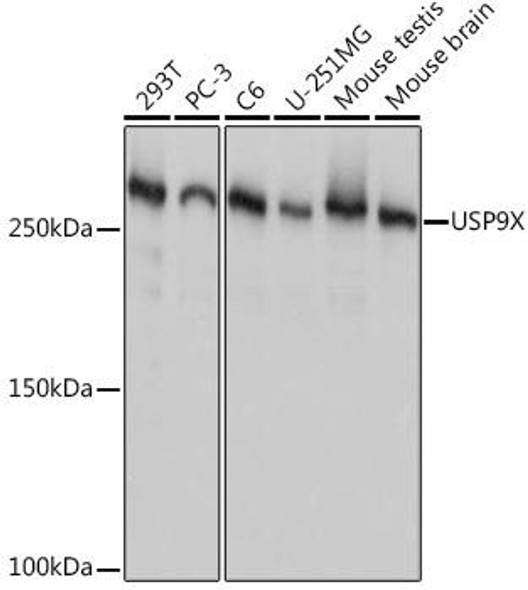| UniProt Protein Function: | USP9X: Deubiquitinase involved both in the processing of ubiquitin precursors and of ubiquitinated proteins. May therefore play an important role regulatory role at the level of protein turnover by preventing degradation of proteins through the removal of conjugated ubiquitin. Essential component of TGF-beta/BMP signaling cascade. Regulates chromosome alignment and segregation in mitosis by regulating the localization of BIRC5/survivin to mitotic centromeres. Specifically hydrolyzes both 'Lys-29'- and 'Lys-33'-linked polyubiquitins chains. Specifically deubiquitinates monoubiquitinated SMAD4, opposing the activity of E3 ubiquitin-protein ligase TRIM33. Interacts with SMAD4, MARK4, NUAK1 and BIRC5/survivin. Widely expressed in embryonic and adult tissues. Belongs to the peptidase C19 family. 2 isoforms of the human protein are produced by alternative splicing. |
| UniProt Protein Details: | Protein type:EC 3.4.19.12; Protease; Ubiquitin-specific protease; Ubiquitin conjugating system Chromosomal Location of Human Ortholog: Xp11.4 Cellular Component: growth cone; membrane; apical part of cell; cytoplasm; cytosol Molecular Function:protein binding; cysteine-type endopeptidase activity; ubiquitin-specific protease activity; cysteine-type peptidase activity Biological Process: mitosis; proteasomal ubiquitin-dependent protein catabolic process; transcription initiation from RNA polymerase II promoter; protein deubiquitination; transcription, DNA-dependent; axon extension; in utero embryonic development; hippocampus development; neuron migration; female gamete generation; negative regulation of transcription from RNA polymerase II promoter; cerebellar cortex structural organization; post-embryonic development; chromosome segregation; BMP signaling pathway; cell division; transforming growth factor beta receptor signaling pathway; gene expression Disease: Mental Retardation, X-linked 99 |
| NCBI Summary: | This gene is a member of the peptidase C19 family and encodes a protein that is similar to ubiquitin-specific proteases. Though this gene is located on the X chromosome, it escapes X-inactivation. Mutations in this gene have been associated with Turner syndrome. Alternate transcriptional splice variants, encoding different isoforms, have been characterized. [provided by RefSeq, Jul 2008] |
| UniProt Code: | Q93008 |
| NCBI GenInfo Identifier: | 317373496 |
| NCBI Gene ID: | 8239 |
| NCBI Accession: | Q93008.3 |
| UniProt Secondary Accession: | Q93008,O75550, Q8WWT3, Q8WX12, |
| UniProt Related Accession: | Q93008 |
| Molecular Weight: | 2570 |
| NCBI Full Name: | Probable ubiquitin carboxyl-terminal hydrolase FAF-X |
| NCBI Synonym Full Names: | ubiquitin specific peptidase 9, X-linked |
| NCBI Official Symbol: | USP9X |
| NCBI Official Synonym Symbols: | FAF; FAM; DFFRX; MRX99 |
| NCBI Protein Information: | probable ubiquitin carboxyl-terminal hydrolase FAF-X; hFAM; fat facets in mammals; ubiquitin thioesterase FAF-X; deubiquitinating enzyme FAF-X; ubiquitin thiolesterase FAF-X; fat facets protein related, X-linked; fat facets protein-related, X-linked; Dros |
| UniProt Protein Name: | Probable ubiquitin carboxyl-terminal hydrolase FAF-X |
| UniProt Synonym Protein Names: | Deubiquitinating enzyme FAF-X; Fat facets in mammals; hFAM; Fat facets protein-related, X-linked; Ubiquitin thioesterase FAF-X; Ubiquitin-specific protease 9, X chromosome; Ubiquitin-specific-processing protease FAF-X |
| Protein Family: | Probable ubiquitin carboxyl-terminal hydrolase |
| UniProt Gene Name: | USP9X |
| UniProt Entry Name: | USP9X_HUMAN |







